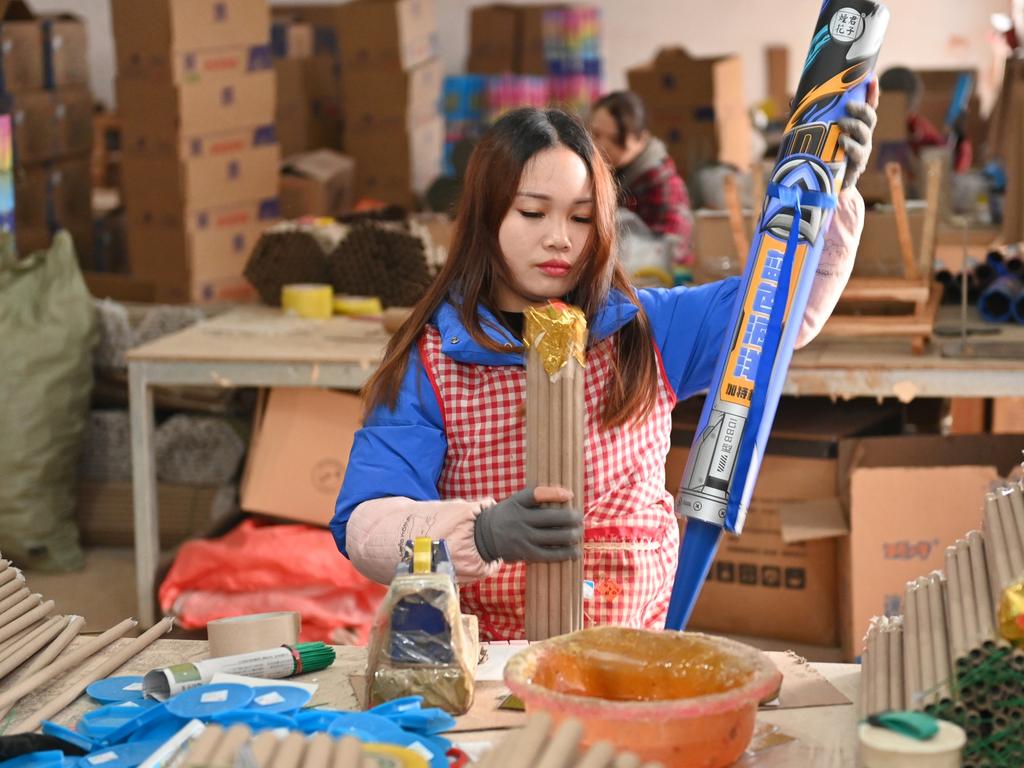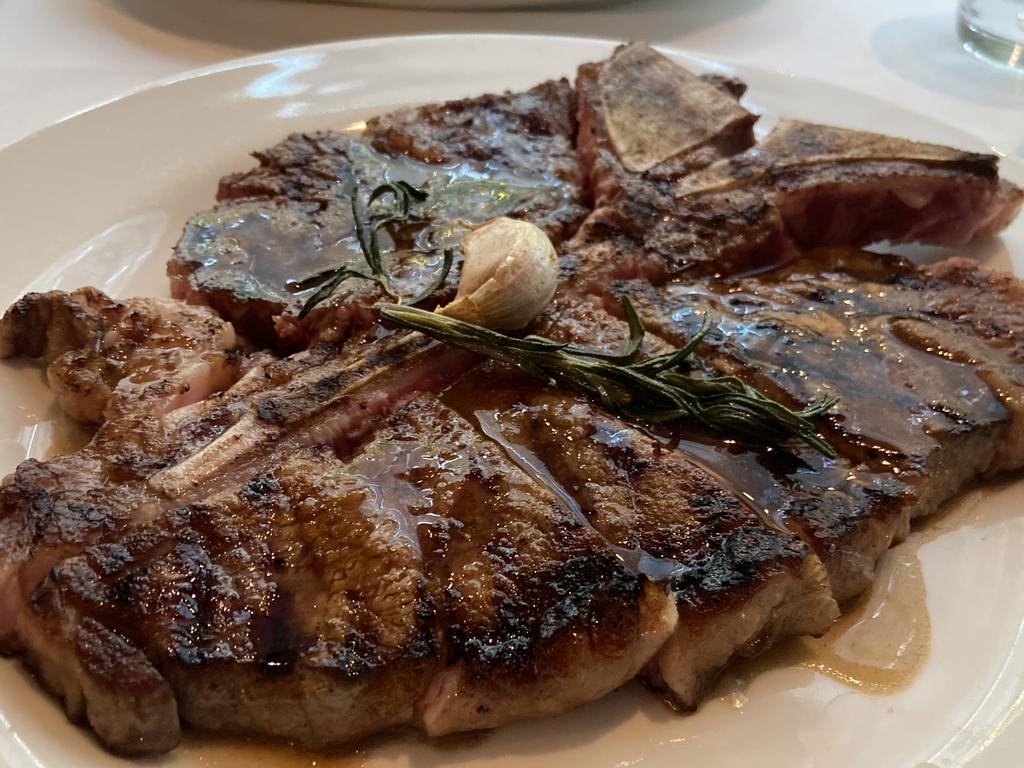China increasingly confident ‘Xiconomics’ will beat Donald Trump’s America
Factories in China are closing and exports to the country’s biggest export market have tanked – while Beijing insists it has Donald Trump on the back foot.

Factories in China are closing, exports to the country’s biggest export market have tanked – and all the while Beijing insists it has Donald Trump on the back foot.
Approaching the halfway mark of the first year since Trump returned to the White House, Chinese officials want to make one thing clear about the future of US-China relations: “China will definitely win,” a Chinese official tells The Australian. “Win everything,” the official adds.
America – led right now by a self-described “very stable genius” – does not have a monopoly on hubris. Ahead of meetings in London with senior Trump administration officials that ended on Wednesday with a fragile truce, Chinese officials were at pains to stress that they were entering talks from a position of strength.
There were some holes in that story. Official data out on Monday showed China’s exports to the US had fallen by 34 per cent in May, despite America reducing ultra high tariff levels on Chinese goods to around 45 per cent. It was the biggest drop since Beijing shut down its economy at the beginning of the Covid pandemic.
Those tumbling export numbers closely followed a survey of China’s manufacturing sector out last week which recorded the worst slump since 2022.
But some of China’s self-confidence has firmer foundations.
President Xi Jinping’s decision to use China’s dominance of rare earths to teach the Trump administration that they too are vulnerable to chokepoints is the reason the US President was so desperate for the London meeting to take place.
“We do absolutely expect that the topic of rare earth minerals and magnets with respect to the United States of America will be resolved in this framework implementation,” US Commerce Secretary Howard Lutnick said on Wednesday after the meetings finished.

Xi has made clear that he will flex China’s supply-chain strength when he deems it necessary. America’s supply of rare earths will be turned on and off as he sees fit.
Beijing has been preparing for this showdown for years with a policy China’s state media calls, without a trace of embarrassment, “Xiconomics”.
At its core is the importance of economic self-sufficiency, the elevation of security, a stronger role for ideology, all bundled together by China’s leader.
“From the past reliance on imported matches, soap and iron, to now becoming the world’s largest manufacturing country with the most complete industrial categories, we have taken the right path,” Xi said in May during a visit to a ballbearing factory that was widely publicised in China.
“We need to keep improving our manufacturing sector, insist on self-reliance and self-improvement (and) master key core technologies.”
Despite the best efforts of Xiconomics, China is still trailing in some key areas. Trump still has plenty of ways to cause China pain.
Chinese tech giants ByteDance, Alibaba and Tencent have been grumbling about Huawei’s new Ascend range of chips. The Chinese-made chips “often overheat and stop working”, according to a well-sourced report in The Information this week.
The Chinese firms would prefer to use world-leading chips made by US chip behemoth Nvidia, which Trump administration restrictions have curtailed.
For all the confident posturing, Chinese negotiators in London were desperate for those restrictions to be unwound, as well as Washington’s choking of jet engine parts, chip design software, chemicals and nuclear materials.
Lutnick made clear no relief would come until China resumed its supply of rare earths.
“When they approve the licences, then you should expect that our export implementation will come down as well,” he said.
‘Moving to Vietnam’
In an effort to more fully explore how the US-China trade war is affecting Australia’s biggest trading partner, The Australian headed to Chongqing, a giant metropolis in the country’s southwest to meet with some of the city’s top officials and a selection of its most important businesses.
The city is a more accurate barometer of the national economy than China’s sheltered political capital, Beijing, or its showcase financial centre, Shanghai, where Reserve Bank of Australia deputy governor Andrew Hauser visited during a brief fact-finding trip in April.
Australia’s central bank remains relatively bullish on China, forecasting GDP growth of 4.8 per cent for 2025 and 4.4 per cent in 2026.
A day before Trump was inaugurated in January, Chongqing mayor Hu Henghua set a 6 per cent growth target for the city in 2025. That now looks like a real stretch.
The US was Chongqing’s biggest export market last year, worth 14 per cent of the total, nearly the same proportion for China as a whole.
Asked by The Australian if the fallout from Trump’s trade war meant that growth target had been revised downward, Hu handballed the question to one of his economic officials.
“We are very confident about achieving our goals,” said Zhang Yongwu, director of the Chongqing Municipal Commission of Commerce.

Chongqing is China’s top exporter of personal computers. Almost one in three laptops in the world are made in the city.
The US has been by far the biggest market. In the industrial precinct in the city’s west where most computer factories are clustered, people speak much more candidly than the city’s officials about the economic pain being caused by the showdown with America.
Outside the gate of a factory run by Foxconn, the Taiwanese electronics manufacturing giant, a supplier said the company was reducing its operations in Chongqing where they make laptops for the American multinational Hewlett-Packard. “They’re moving to Vietnam,” he told The Australian.
HP’s reduction of its Chinese operations follows the diversification of fellow US computer manufacturer Dell, which began reducing its Chongqing operations in Trump’s first term.
Leaving is tricky, such is the cluster of interlinked supply chains that have built up in the city over almost two decades. But in recent years, tens of thousands of jobs have left the city, a human resource agent told The Australian.
Things look much more promising for Chongqing’s EV sector, a darling of the Xi era.
A visit to the factory floor of Avatr – a partnership between the state-owned car giant Changan, China’s world-beating lithium battery company CATL, and Huawei – illustrates why carmakers from Germany to Japan to the US speak in anxious tones when discussing their Chinese competitors.

Robots are ubiquitous. The labour force is diligent. And the whole operation is supported by an ecosystem of state support unlike anywhere else in the world.
Huge tariffs have cut off the US market, but Avatr is getting on with selling to the rest of the world.
Li Li, founder and president of Next Capital, one of China’s leading hi-tech venture capital investment funds, has visited Japan, Mexico, Brazil, the US and the UK in the past year.
She said China’s days as a technology laggard are a thing of the past and credits the country’s disciplined, long-term approach.
“This is the result of the joint efforts of enterprises, industries and governments in the past few decades,” Li told The Australian.
Win the ‘protracted war’
To many in China today, Chongqing is best known for the drone shows that swarm the city’s night sky in their thousands every Saturday, but the place is a lot more than a backdrop for viral videos.
Chongqing was China’s capital during World War II, giving it a special place in China-US relations. It was the city from which US General Joseph Stilwell oversaw American and Allied forces in China as they fought against the Imperial Japanese Army.
Ever since the trade war in Trump’s first term, Beijing’s propaganda machine has focused on another war, which the Communist Party calls the “War to Resist US Aggression and Aid Korea”, better known in Australia as the Korean War.
In 2020, China’s propaganda department commissioned a jingoistic three-part film trilogy celebrating the People’s Liberation Army for fighting the US and the other UN-backed forces, including from Australia, that came to the defence of South Korea after it was invaded by Soviet-backed North Korea.
The first two gory instalments of the Battle at Lake Changjin franchise were behemoths at the Chinese box office, both benefiting from a state campaign to encourage viewers. The third in the series is expected to be released on October 1, Chinese national day.
While the film’s message about bravely fighting Americans seems scripted for the moment, it also shows how fastidiously Xi’s government has been preparing public sentiment.

Chinese policy makers are in almost total unison that this economic battle will be a “protracted war”, citing a phrase popularised by Mao Zedong.
Their new regime for restricting rare earths was years in the making.
Some in Canberra see an opportunity for Australia to step in as a rival source of the commodities, but that would require a level of government investment and long-term planning far beyond anything committed so far by the Albanese government.
Meanwhile, China is amassing further supply chain leverage across an increasing range of “overlapping industries”, as Arthur Kroeber, head of research at China-focused consultancy Gavekal, recently pointed out.
“The balance of leverage is shifting fast in China’s favour, a fact that the Trump team has only barely begun to recognise,” Kroeber wrote in a recent note to clients.
It’s an assessment not a world away from even the cockiest Chinese official.








To join the conversation, please log in. Don't have an account? Register
Join the conversation, you are commenting as Logout